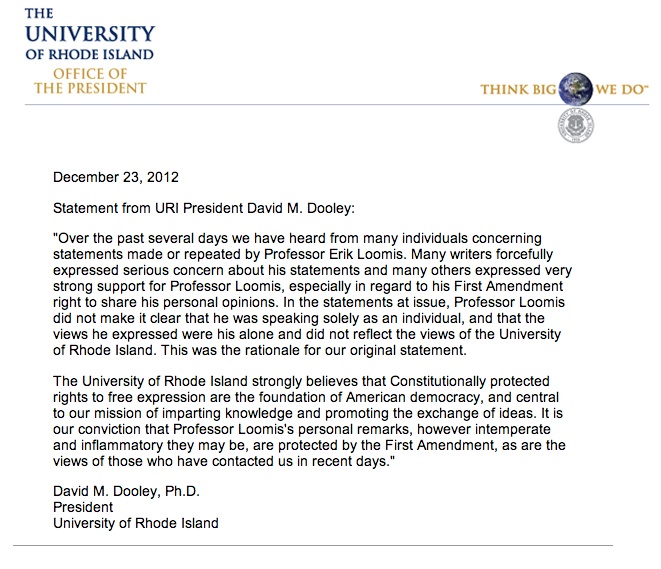The URI administration has issued a new statement:
What to make of this?
On the one hand, I don’t think anybody will buy the claim that (1) Erik is at fault for “not making clear that he was speaking solely as an individual” and (2) that this failure provided the “rationale for our original statement.” The URI administration doesn’t go far enough in terms of redressing the most offensive part of the earlier, rushed response: its implicit characterization of Erik’s comments as “acts or threats of violence.”
On the other hand… I’ll just outsource the “other hand” to Corey Robin:
The statement is weaselly and certainly doesn’t convey any deep understanding of the issues at stake. But in my experience, this is most definitely a victory. We are dealing with university administrators, remember. So the university gives itself a bullshit face-saving way out of its own embarrassment (paragraph one) yet affirms the basic right of faculty to speak out — even in what it considers to be an intemperate fashion — and affirms that that freedom is central to its mission (paragraph 2). The latter was very much in doubt less than a week ago; it no longer is. I count that as a win.
In sum: something of an early Christmas gift to the forces of truth, justice, and the academic way.
Daniel H. Nexon is a Professor at Georgetown University, with a joint appointment in the Department of Government and the School of Foreign Service. His academic work focuses on international-relations theory, power politics, empires and hegemony, and international order. He has also written on the relationship between popular culture and world politics.
He has held fellowships at Stanford University's Center for International Security and Cooperation and at the Ohio State University's Mershon Center for International Studies. During 2009-2010 he worked in the U.S. Department of Defense as a Council on Foreign Relations International Affairs Fellow. He was the lead editor of International Studies Quarterly from 2014-2018.
He is the author of The Struggle for Power in Early Modern Europe: Religious Conflict, Dynastic Empires, and International Change (Princeton University Press, 2009), which won the International Security Studies Section (ISSS) Best Book Award for 2010, and co-author of Exit from Hegemony: The Unraveling of the American Global Order (Oxford University Press, 2020). His articles have appeared in a lot of places. He is the founder of the The Duck of Minerva, and also blogs at Lawyers, Guns and Money.



0 Comments